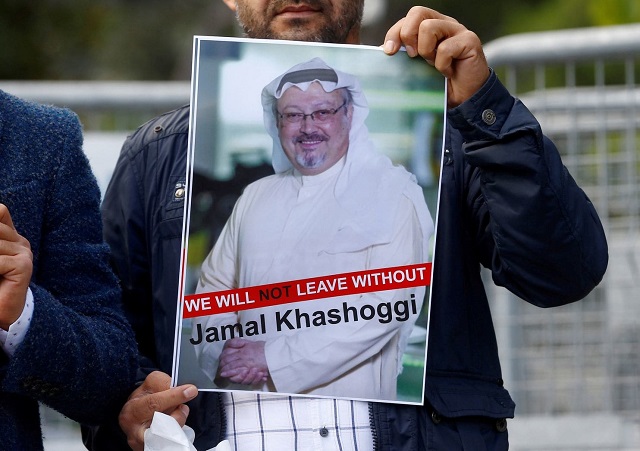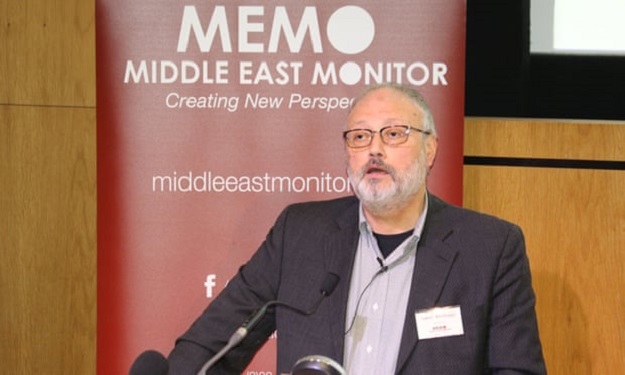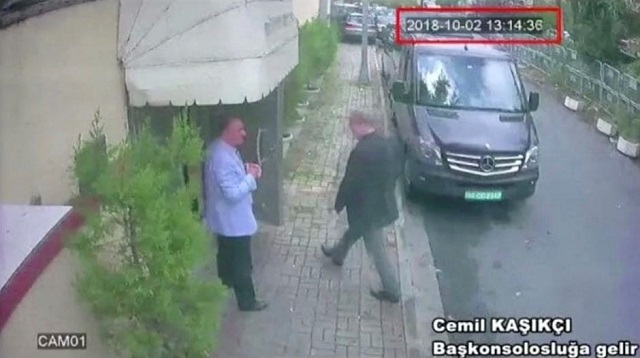
He said he could write freely in the United States in a way that was impossible at home, according to friends and colleagues, but he was increasingly worried that Riyadh could hurt him or his family.
In Turkey, though, Khashoggi had friends in high places, including some of President Tayyip Erdogan’s advisers.
 amal Khashoggi speaking at an event in London on 29 September. PHOTO: REUTERS
amal Khashoggi speaking at an event in London on 29 September. PHOTO: REUTERSSo when he walked into the Saudi consulate in Istanbul at 1pm on Tuesday, October 2, he hoped the appointment would be brief, a simple bureaucratic task that would allow him to marry his Turkish fiancee, whom he had met four months earlier.
“He said the safest country in the world for Saudi Arabians was Turkey,” said Yasin Aktay, an Erdogan aide and close friend of Khashoggi. Friends and family have not seen him since.
#JamalKashoggi was a contributor to the Washington Post’s global opinions section. Last week The Post ran a black column “This should be the column by Jamal Kashoggi” https://t.co/9otE59BE57
— Shefali S. Kulkarni (@shefalikulkarni) October 7, 2018
Turkish officials have said they believe Khashoggi, 59, was killed inside the consulate.
Saudi Arabia has strongly rejected the accusation. The kingdom’s ambassador to the United States, Prince Khalid bin Salman, said reports suggesting Khashoggi went missing in the Istanbul consulate or that Saudi Arabia had killed him “are absolutely false and baseless” and a product of “malicious leaks and grim rumors.”
Trump 'concerned' over disappeared Saudi journalist
Jamal is a Saudi citizen who went missing after leaving the Consulate,” the ambassador said in a statement.
Saudi Arabia has sent a team of investigators to work with Turkish authorities and “chase every lead to uncover the truth behind his disappearance.”
In interviews, Turkish officials provided new details of their investigation into the missing journalist.
Trump/Kushner’s total silence re #JamalKashoggi disappearance is disgraceful, esp as it’s THEIR Saudi policy that leads MBS to believe he can assassinate journalists, critics & activists without consequence.
— Rula Jebreal (@rulajebreal) October 8, 2018
Kudos to DC Mayor showing moral leadership in the vacuum of this WH. pic.twitter.com/Rvw7UqEPq1
Two senior Turkish officials revealed the existence of an object that may provide important clues to Khashoggi’s fate: the black Apple watch he was wearing when he entered the consulate. The watch was connected to a mobile phone he left outside, they said.
Investigators are also focusing on 15 Saudi men who entered the consulate around the same time as Khashoggi and left a short time later.
#Saudi Arabia denies killing of Jamal #Kashoggi inside its consulate in Istanbul but hasn't shown evidence that he left the consulate building last Tuesday. pic.twitter.com/FfZXRnn3uH
— Yannis Koutsomitis (@YanniKouts) October 7, 2018
These men had arrived hours earlier from Riyadh, most of them by private plane, the officials said. By the end of the day, they were on their way back to the kingdom.
Turkish newspaper Sabah said on Wednesday it had identified the 15 as members of a Saudi intelligence team.
They included a forensic expert. A Turkish official did not dispute the report.
 A still image taken from CCTV video and obtained by TRT World claims to show Saudi journalist Jamal Khashoggi as he arrives at Saudi Arabia's consulate in Istanbul, Turkey Oct. 2, 2018. Reuters TV/via REUTERS
A still image taken from CCTV video and obtained by TRT World claims to show Saudi journalist Jamal Khashoggi as he arrives at Saudi Arabia's consulate in Istanbul, Turkey Oct. 2, 2018. Reuters TV/via REUTERSAnd investigators are trying to trace a vehicle that left the Saudi consulate at the same time as two cars destined for the airport, one of the officials said.
This vehicle didn’t turn toward the airport, but set off in the opposite direction.
This story is based on interviews with Turkish officials, Khashoggi’s fiancee and more than a dozen of his friends, who gave insight into the columnist’s state of mind in the days leading up to his disappearance, and explained why he went to the Saudi consulate in Istanbul, not the embassy in his adopted home of Washington.
The case threatens to drive wedges between Saudi Arabia and Turkey and between Riyadh and its western allies.
US President Donald Trump said on Oct 9 he plans to speak with Saudi Arabian officials about Khashoggi’s disappearance.
The mystery also threatens to undermine Crown Prince Mohammed bin Salman’s drive to attract foreign investors and new high-tech business to a country that is too dependent on oil revenues.
A NEW LIFE
Khashoggi met his Turkish fiancee, Hatice Cengiz, who is 23 years his junior, in May at a conference in Istanbul, according to Cengiz and a close friend of the Saudi journalist.
Their relationship quickly evolved, and Khashoggi spoke about wanting to start a new life with her. By August, the couple had decided to marry in Turkey, where Cengiz lived, and spend much of their time there.
Washington Post pushes US govt to demand answers on Saudi journalist
“Jamal bought an apartment in Istanbul and we were furnishing our new home,” Cengiz told Reuters on Oct 9. “We were planning to marry this week before Jamal flew back to Washington.”
The decision to marry in Istanbul, whose mosques reminded Khashoggi of his hometown Medina, set off a paper chase that ultimately ended in Khashoggi’s disappearance.
The other six men arrived on commercial flights, the security source said. The 15 men checked in, briefly, to two hotels, the Movenpick and Wyndham, which are close to the Saudi consulate. The hotels declined to comment.
President Trump must ask Saudis to give full and credible account of what happened to Jamal Khashoggi inside their Istanbul consulate. And tell us what he knows too.
— Thomas L. Friedman (@tomfriedman) October 7, 2018
As pressure built on Saudi Arabia to locate their missing citizen, Saudi officials in Istanbul showed a Reuters reporter around the consulate on Saturday, Oct 6, opening cupboards and inviting him to inspect the ladies’ bathroom. A few hours later, Turkish authorities said they believed Khashoggi had been killed.
A Saudi source told Reuters that British intelligence believed there had been an attempt to drug Khashoggi inside the consulate that culminated in an overdose.
What can investigators learn from an Apple Watch in the case of missing Saudi journalist Jamal Khashoggi? https://t.co/T9pl2mZziw Via @Orhan__Coskun, @SarahDadouch and @stephenkalin pic.twitter.com/lGglDpCAAM
— Reuters (@Reuters) October 10, 2018
He said the information came from a British intelligence source. Contacted by Reuters, British intelligence did not comment. Asked about this account, a Saudi official said: “This death is not true.”
Reform not revolution
Khashoggi’s message in his columns for the Washington Post was one of reform, not revolution.
He often championed political change but did not question the Saudi monarchy as an institution.
He criticized the royal family for misusing Saudi’s oil wealth and questioned specific policies, such as the war in Yemen and the arrests of Saudi intellectuals and activists.
His bumpy relations with the Saudi authorities and the clerical establishment predated the rise of Crown Prince Mohammad bin Salman.
In 2003 he was fired as editor-in-chief of reform newspaper Al Watan, less than two months into his tenure, after publishing columns critical of the growing influence of the religious establishment in Saudi Arabia.
Erdogan says closely following case of missing Saudi journalist
In 2007, he was named editor-in-chief of Al Watan for a second time but was forced to resign three years later after publishing an article that challenged some elements of Salafism.
Khashoggi was also the consummate insider, as an adviser to former intelligence chief Prince Turki al Faisal and a confidant of billionaire investor Prince Alwaleed bin Talal.
Yet by early 2017, he was feeling the heat again. The authorities ordered him to stop writing and tweeting, then he watched as other writers, including several friends, were detained in a crackdown on dissent in September, 2017.
"He was outside [the country], so he didn’t return,” said his friend, Tamimi.
In the United States, he felt he could speak freely. Karen Attiah, his editor at the Washington Post, said it was as if he had rediscovered journalism.
“When he was in the newsroom, when I brought him the first time, he became energized. He took a selfie and said, ‘I miss this. I miss being in a newsroom.’ We spoke about editing and what it was like to talk to writers. He just lit up,” she said.
An acquaintance said Khashoggi was considering launching new projects from Washington. One idea focused on bringing attention to political prisoners in Saudi Arabia and promoting democracy in the Arab world, said the acquaintance.
Attiah, the global opinions editor of the Washington Post, said Khashoggi rarely expressed fears for himself but he was “really torn up” about the pressures on his family. “I did worry about Jamal,” she said. “I just thought, ‘Who would be so brazen to go after him?’”
1731570357-0/elon-musk-(1)1731570357-0-405x300.webp)
-(1)1717678110-0/Kendrick-(1)-(1)1717678110-0-165x106.webp)





1732445375-0/Untitled-design-(9)1732445375-0-270x192.webp)


1732428810-0/Copy-of-Untitled-(3)1732428810-0-270x192.webp)






COMMENTS
Comments are moderated and generally will be posted if they are on-topic and not abusive.
For more information, please see our Comments FAQ